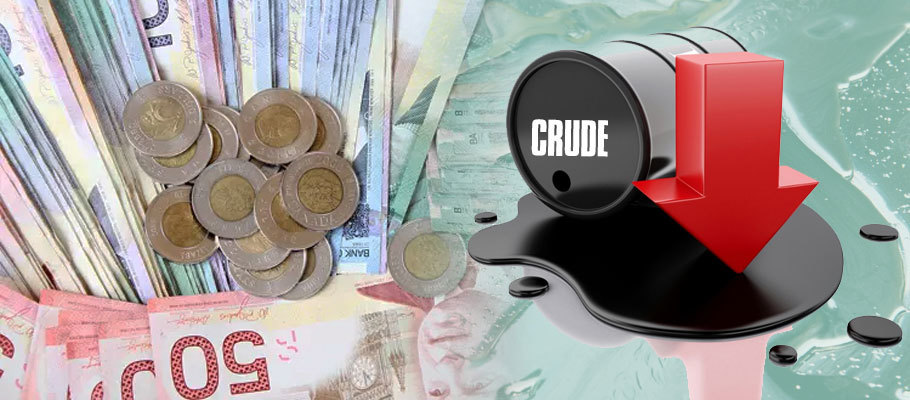
Published: March 16th, 2022
The Canadian dollar slipped against the greenback as markets opened this week despite a significant rally in oil prices. Analysts believe that the divergence in crude and CAD pricing is likely to be temporary, though it's not the first time the traditional oil-loonie correlation has been broken.
At time of writing CAD had dipped by around half a percentage point against the US dollar for the 2022 year-to-date. That’s despite a 60 per cent increase in global crude prices and a 34 per cent gain for Canada’s benchmark Western Canada Select in the same timeframe.
For investors who categorise Canada’s fiat as a “petrocurrency,” there's an expectation that its value will rise and fall in tandem with oil prices. This week’s price action will therefore have come as a shock. Analysts at Canada’s CIBC bank, however, say that the relationship between CAD and oil has been evolving for years. Many forex traders have simply not understood that things have changed.
In a market analysis, CIBC’s currency research unit wrote that ‘despite what we’ve witnessed in terms of CAD’s steadiness in the face of volatile crude prices, statistical evidence is building that supports the notion of a weaker link between oil and CAD, which tends to correspond with softening Canada-US interest differentials.
CIBC’s research shows that that capital spending and investment in Canada’s oil sector fell from almost four percent of GDP in late 2014 to just above one percent in 2021. That drop in capex happened regardless of oil price rises that occurred frequently through the period.
The take-away is that rising oil prices no longer came with a propensity to drive increased employment, income growth, or inflation. ‘That de-coupling has meant that oil prices have less influence than they used to on Bank of Canada (BoC) monetary policy,’ CIBC wrote.
‘If we consider the period from late 2018, when capital spending in the Canadian oil sector had finished its retrenchment, the correlation disappears completely, even dipping into negative territory at times. Investors have stopped looking at oil prices as a driver of relative interest rates between Canada and America’.
‘Looking strictly at the last 12 months, the correlation has evaporated. That’s arguably too small a window to make a sweeping statement about how oil will impact the loonie, or not. Oil is just one factor, and the last year has brought big changes in expectations for central bank policy. Whether its been the fallout from pandemic or geopolitical tension, the drivers behind CAD prices have been much broader than crude oil prices.’
Despite the disruption it may cause forex traders engaging in fundamental analysis, CIBC says the softening correlation between CAD and oil prices is a favourable development for Canadian upstream oil companies. It means their own foreign currency earnings are less likely to be at the whim of rising and falling loonie exchange rates.
‘They’ll be in a better position to reap the benefits of climbing crude price per barrel without having profitability chipped away by appreciation in the Canadian dollar. On the flip side, if oil prices do start to retreat from recent highs, it shouldn't drag down demand for the loonie, which is what we would have expected to see in the past.’
A weaker oil-dollar dynamic could also potentially lead to a reduction in the extent to which domestic Canadian oil companies use currency hedging to reduce the risk of exchange rate volatility, which often involves buying more Canadian dollars.
Similarly, a lessened correlation could lend a supportive hand to the Loonie in periods when global oil prices are falling, and particularly if there has been a shift to large scale hedging positions.
The market support could arrive if spurred by already-lower hedge ratios and dipping oil prices, which might potentially lead to a rise in hedging-related demand for Canadian dollars.
CIBC says it continues to foresee a modest weakening in the loonie over the next two quarters, however that has less to do any likely slippage in the oil price than with changes to Bank of Canada monetary policy.
‘We're of course aware of the Ukraine conflict and the upside surprises in inflation that have alrady occurred. Nonetheless we’re standing by the 100 basis points we expect from both the Bank of Canada and the US Fed in 2022, with further rises likely in store for 2023 and 2023.
The first time analysts widely noted the breakdown in correlation between CAD and oil prices happened in May of 2020 when the loonie held firm while oil prices plummeted.
The Canadian dollar stood strangely stolid in the midst of a historic plunge that saw crude oil futures go negative for the first time ever. While other oil-dependent currencies like the Norwegian Krone and Mexican peso sank, the Loonie held its value, sliding a mere 0.7 per cent against the greenback.
That CAD display of stability was in sharp contrast to the full seven per cent drop in West Texas Intermediate that happened the same week, a comeback from losses approaching USD 40 per barrel.
Canada's currency and oil prices had been in-sync for most of the year. But then the coronavirus pandemic brought the global economy to its knees and slashed demand for energy commodities.
From that point forward oil-CAD link started to un-couple, disconnecting completely when markets offloaded front-month oil futures contracts on reports of a storage capacity crunch exacerbated by the global glut.
Analysts had different takes on why the historic correlation between oil and loonie price action might have broken down.
Some said forex traders had already priced-in the risk of slumping demand exacerbated by too much supply. Others believed the threat of a crash in tight urban property markets like Vancouver and Toronto could hurt the economy and thereby the loonie, prompting more softening of the relationship.